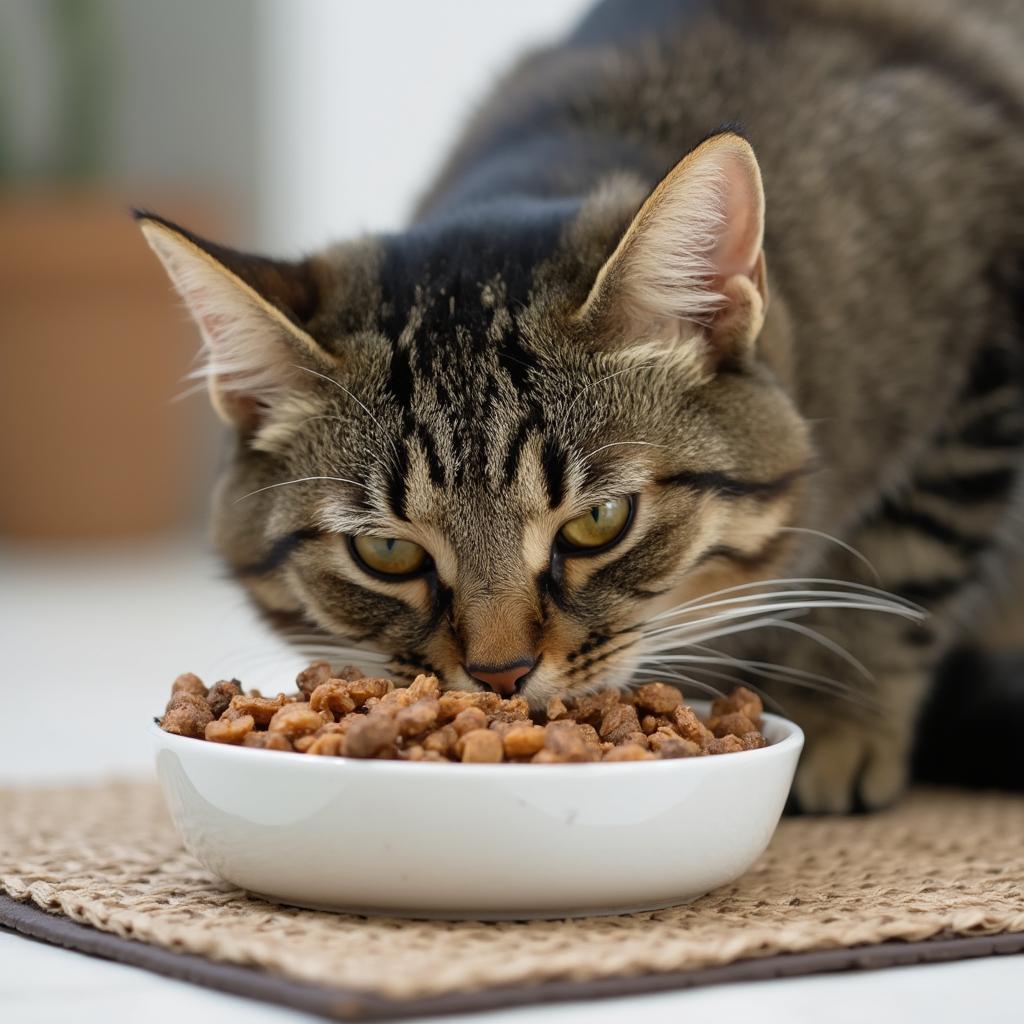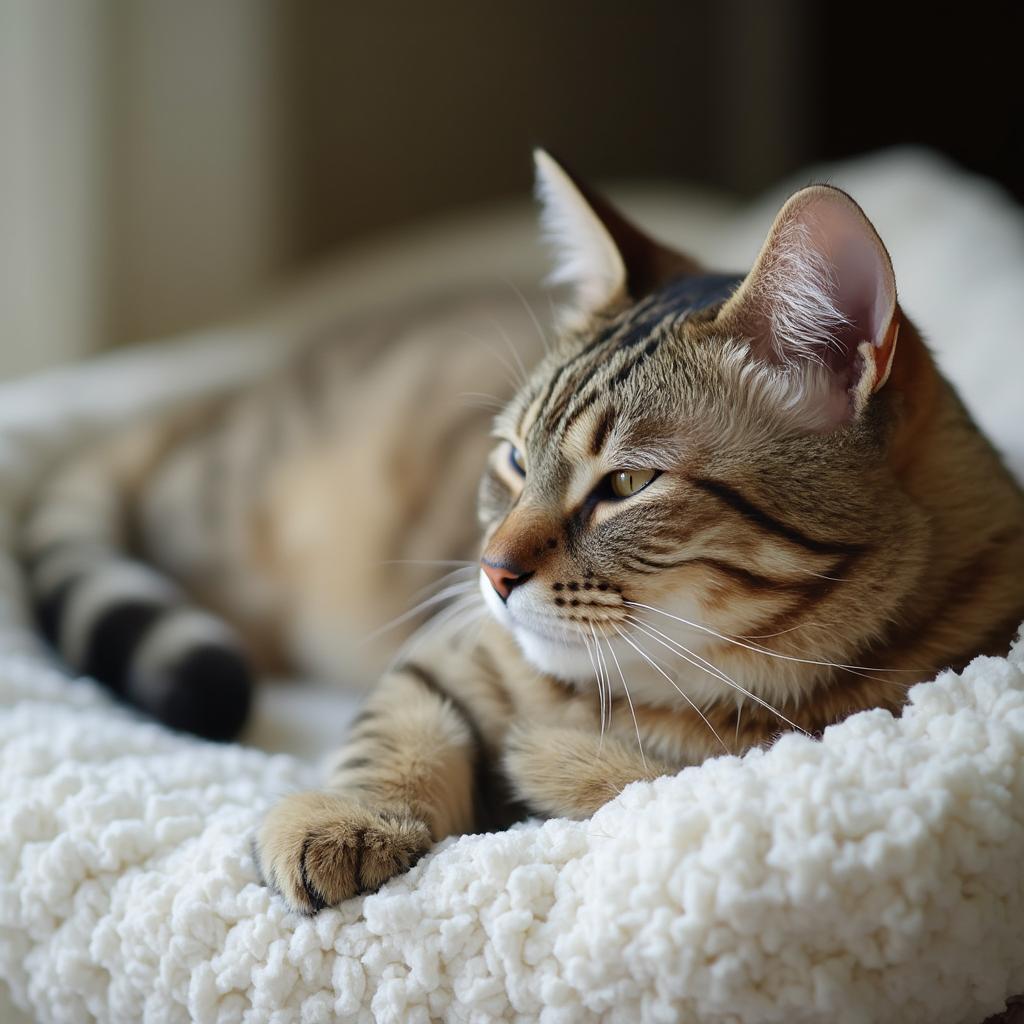Your cart is currently empty!

Essential Cat Care Tips for a Happy and Healthy Feline
Cat care is more than just providing food and water; it’s about understanding your feline friend’s needs and providing a nurturing environment for them to thrive. From understanding their nutritional requirements to ensuring their mental and physical well-being, proper cat care contributes significantly to a longer, healthier, and happier life for your furry companion.
Understanding Basic Cat Care Needs
At the heart of cat care is understanding their fundamental needs. These include providing a nutritious and balanced diet, fresh water, a clean litter box, regular grooming, and plenty of opportunities for play and exercise. This basic cat care tips guide covers the essentials to ensure your cat stays healthy and happy. Ignoring these basic needs can lead to behavioral problems, health issues, and a decreased quality of life for your cat.
What are the key elements of a balanced cat diet? Cats are obligate carnivores, requiring a diet rich in animal protein. Look for cat food that lists meat as the primary ingredient. Avoid foods high in fillers like corn and wheat.
How often should I clean my cat’s litter box? A clean litter box is essential for cat hygiene and can prevent behavioral issues like urinating outside the box. Scoop the litter box at least once a day, and completely change and clean it weekly.
 Cat Enjoying a Healthy Meal
Cat Enjoying a Healthy Meal
Grooming Your Cat: More Than Just Aesthetics
Regular grooming plays a vital role in cat care, going beyond just keeping your cat looking beautiful. Brushing helps remove loose hair, preventing hairballs, and distributes natural oils, keeping their coat healthy and shiny. Regular nail trims are also crucial to prevent overgrowth and potential discomfort. For specific breeds, you might need specialized grooming. You can find helpful tips in our guide for maine coon cat care tips.
Why is brushing important for cat care? Brushing helps prevent matting, especially in long-haired cats, and reduces the amount of hair your cat ingests while grooming themselves.
How often should I groom my cat? The frequency of grooming depends on your cat’s coat length. Short-haired cats may only need weekly brushing, while long-haired cats may require daily brushing.
Ensuring Your Cat’s Mental and Physical Well-being
Cat care encompasses both physical and mental health. Providing a stimulating environment with toys, climbing structures, and opportunities for interaction is essential for preventing boredom and promoting a happy, well-adjusted cat. Regular veterinary check-ups are also crucial for preventative cat care, catching potential health issues early. Consider also our outdoor cat care tips if your cat spends time outside.
What are some signs of a stressed cat? Changes in behavior, such as excessive grooming, hiding, or aggression, can indicate stress in cats.
How can I enrich my cat’s environment? Providing a variety of toys, scratching posts, and high perches can help keep your cat entertained and stimulated.
Specialized Cat Care: Addressing Specific Needs
Different life stages and situations require tailored cat care approaches. Pregnant cats, stray cats, and cats with specific medical conditions all have unique needs that must be addressed. For expecting cats, learn more with our pregnant cat care tips. If you are caring for a stray, we have compiled valuable information in our stray cat care tips guide.
What are some specific Cat Care Tips for senior cats? Senior cats may need softer food, easier access to litter boxes, and more frequent veterinary check-ups.
 Senior Cat Relaxing
Senior Cat Relaxing
Conclusion: Providing the Best Cat Care
Cat care is a rewarding experience that strengthens the bond between you and your feline companion. By understanding their needs and providing a loving and supportive environment, you can ensure your cat lives a long, healthy, and fulfilling life. Implementing these cat care tips will not only benefit your cat’s physical health but also contribute to their emotional well-being.
FAQ
- What is the best type of cat food? The best type of cat food is one that is high in animal protein and meets your cat’s specific age and health needs.
- How can I tell if my cat is sick? Look for changes in behavior, such as decreased appetite, lethargy, or vomiting.
- How often should I take my cat to the vet? Cats should have annual check-ups, and more frequently as they age.
- How do I introduce a new cat to my existing cat? Introduce them gradually, allowing them to get used to each other’s scents before direct contact.
- How can I stop my cat from scratching furniture? Provide scratching posts and deterrents like double-sided tape on furniture.
- What are the signs of a happy cat? A happy cat will be playful, affectionate, and have a healthy appetite and coat.
- How do I train my cat? Use positive reinforcement methods like treats and praise.
Need more information? Check out these resources:
For further assistance, please contact us via WhatsApp: +1(641)206-8880, Email: [email protected] or visit our office at 456 Pine Avenue, Toronto, ON M5V 2J4, Canada. Our customer service team is available 24/7.

Leave a Reply